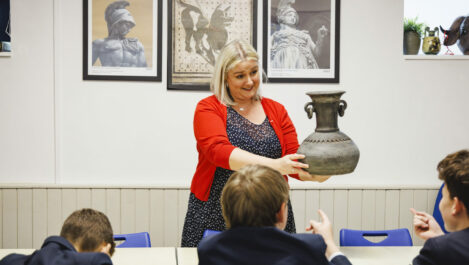Classical Civilisation
Year 9
At Halliford School, Classical Civilisation is introduced at Year 9. The course commences with a focus on the Spartans and the Iliad, moving into a unit on Pompeii and Roman Britain. Students also enjoy a unit on mythology and explore what a myth is and how society uses myth. This is all excellent preparation for the newly developed OCR GCSE syllabus studied in Years 10 and 11 and at A Level.
GCSE
Under the new GCSE syllabus, the students study a range of topics. There are two modules – Myth and Religion (which includes a comparison of Greece and Rome) and Literature and Culture.
Myth and Religion:
- The Gods
- The universal Hero: Heracles / Hercules
- Myths and the City: Foundation Stories
- Festivals
- Myth and Symbols of Power
- Death and Burial
- Journeying to the Underworld
Culture: The Homeric World
- Key sites of Bronze Age Greece
- Life in the Mycenaean Age
- Decorate Arts
- Tombs, Graves and Burial
Literature: The Odyssey
- Literary Techniques and Composition
- Themes
- The Character of Odysseus
- The Portrayal of Key Characters
A Level
Under the new A Level Syllabus the students study three modules. These include:
The World of the Hero: where students will study the works of Homer and Virgil. Students will develop an increasingly sophisticated level of knowledge and understanding of the epics themselves, the way in which they were composed, and the religious, cultural and social values and beliefs of its society.
The poems of Homer were considered by the Greeks themselves to be a foundation of Greek culture, standing as they do at the beginning of the Western literary canon. This component provides students with the opportunity to appreciate the lasting legacy of these works and to explore their attitudes and values. The epics of Homer, with their heroes, gods and exciting narratives, have been in continuous study since their conception, and remain popular with learners and teachers today.
This component also provides learners with the opportunity to appreciate Virgil’s Aeneid, a cornerstone and landmark in Western literature. Drawing inspiration from Homer, as well as from his own cultural and political context, Virgil explored what it was to be a hero in the Roman world and created a work which has proven enduringly popular.
Lover and Relationships: Ideas about love and relationships are key aspects of the literature, thoughts, and ethics of any society. This component offers the opportunity for learners to recognise and relate to the passions, frustrations and delights of love in the ancient world. The ethical questions raised by these ideas continue to be wrestled over by successive generations and this unit will generate interesting and important discussions about love, desire, sex, sexuality and the institution of marriage.
Ancient ideas about men, women and marriage enable learners to discuss the reality of love and relationships in everyday life, whilst study of Seneca and Plato provides a more conceptual approach. Throughout this material learners will be able to draw comparisons and make judgements about ideal and reality, and the nature of ‘right’ and ‘wrong’ ways to love or be loved.
The study of poetry forms the second half of the unit. Sappho provides a link between the Homeric poems and the literature of 5th and 4th century Athens. She is one of very few female voices from the ancient world; the context of her life is fascinating, and her verse is powerful and evocative. Ovid offers a lighter presentation of relationships and concentrates on the fun and flirtation of budding romances.
Greek Theatre: where students will study Sophocles’ Oedipus Rex, Euripides’ Bacchae, and Aristophanes’ Frogs. The drama produced in the ancient Greek theatre forms some of the most powerful literature of the ancient world, and has had a profound and wide-reaching influence on modern culture. To fully understand this cultural phenomenon requires study of not only the plays but the context in which their form and production developed.
To develop this understanding this component involves the study of the physical theatre space used by the Greeks to stage their dramas, and also depictions of this staging in the visual/material record. This study of the production of Greek drama is coupled with an in–depth study of three plays, all of which have proven to be enduring favourites. The themes and concepts explored by these plays are of significant relevance and interest both to the modern audience as well as that of the original performance.
The plays and material culture included in the specification provide learners with a range of interesting sources which will allow them to explore, evaluate and understand this aspect of ancient culture and its relevance to us today.
Tours and Trips
Students have enjoyed trips to Bath, Oxford, and Warwick University.











0 CommentsComment on Facebook